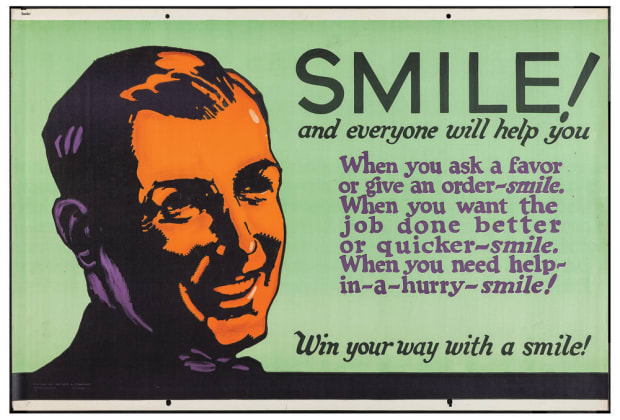
Heritage Auctions
A new year holds much promise. It’s a new beginning, with new hopes, plans and resolutions. It’s a chance to create a new you by leaving behind old habits and other things that no longer fit. If you’re thinking of making a change in your personal or professional life this year, you’re in luck. We have just the thing to make your goals a reality: motivational messages from yesterday.
During the Roaring Twenties, the American spirit was fueled by idealism and economic expansion. Jobs were plentiful, and a movement known as Welfare Capitalism emerged, in which employers countered the grievances of labor unions and socialists by voluntarily offering higher wages, health insurance, reduced hours and paid vacations in exchange for higher productivity and improved employee loyalty.

Heritage Auctions
Watching this movement unfold, Charles Mather, a Chicago printer, followed the advice of a motivational message he would soon create: he heard opportunity knocking and he answered the door. He had seen the success of the government’s propaganda campaign during World War I and seized it as a chance to expand his business. Applying the same advertising techniques, Mather created a motivational series for workers designed to inspire them to do their best, with taglines promoting such admirable qualities as teamwork, punctuality, loyalty, and safety. Mather knew these messages needed to be attention-grabbing, especially in dull, drab work environments, so he commissioned artists including Willard Frederick Elmes, Hal Depuy and Frank Beatty to create eye-catching appeal with bold and colorful graphics to sell these simple, direct messages such as “The Game is Won in the Ninth Inning” and “Excuses Get You Nothing.”
Then, armed with the moxie he would also soon peddle to the working masses, he convinced factory owners and other corporations to buy these motivational messages. Mather created more than 300 of these bold and colorful lithographs between 1923 and 1929 and they became a popular instructional tool for thousands of companies nationwide including General Motors, the Kellogg Company, and Kodak.

Swann Auction Galleries
Mather exemplified another message that later became part of his series: “Those who plunge headlong into their work come out with its prizes. Mean it and you’ll make it.” Mather meant it and he made it. He grew his company, which ultimately extended its reach across the U.S. into Canada, and even to England during the latter part of the 1920s.
During this same period, in fact, the English firm, Parker-Holladay Company, was producing get-right-to-the-point maxims of its own, dispensed by Bill Jones, a fictional business manager. The firm’s American office, also located in Chicago, made Bill Jones trading-sized cards for the American market, where he urged employees to develop pluck and a can-do attitude that develops success. And when you see someone looming as large and in charge as Bill Jones is in some of these messages — carrying the air of confidence and can do-ness that leads to winning — you’re going to feel motivated to follow his advice.

Swann Auction Galleries
This material, especially by Mather, is highly collectible. It was printed using stone lithography and each piece shows a richness of detail and the subtlety of fine texture that gives them their rich look, and they appeal to poster collectors as well as historians.
Although these motivational messages were geared toward workers and the workplace, the traditional virtues they promote are as relevant today as they were then. Mather and Parker-Holladay advocated self-discipline, loyalty, honesty, saving money for the future, diligence, minding your health, not worrying about things that haven’t happened yet, and above all, saying things with a smile. Do this and a job promotion surely awaits!
Almost 100 years later, the advice and general lessons of yesteryear still have value.
Now get busy! But remember to smile.

Heritage Auctions

Potter & Potter Auctions

Swann Auction Galleries

Swann Auction Galleries

Heritage Auctions







